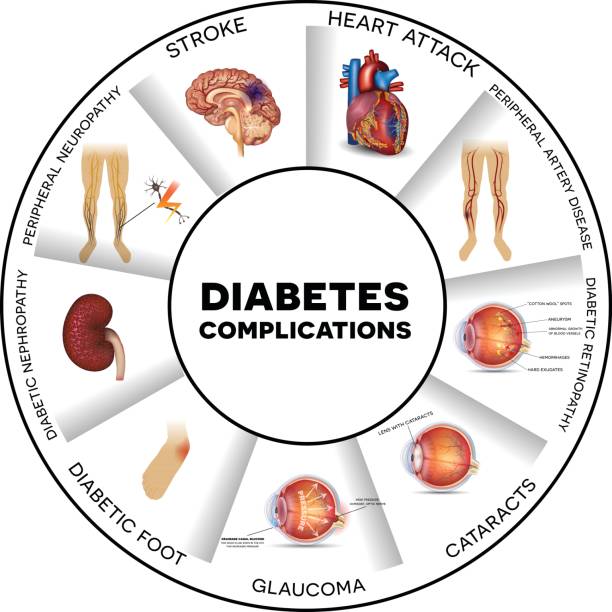
Problems faced by Diabetic Patients

The longer you have diabetes and the less controlled your blood sugar, higher the risk of Problems. Eventually, diabetes problems may be disabling or even life-threatening.
Possible peoblems include
Cardiovascular disease.
Diabetes dramatically increases the risk of various cardiovascular problems, including coronary artery disease with chest pain (angina), heart attack, stroke and narrowing of arteries (atherosclerosis). If you have diabetes, you are more likely to have heart disease or stroke.
Nerve damage (neuropathy).
Excess sugar can injure the walls of the tiny blood vessels (capillaries) that nourish your nerves, especially in your legs. This can cause tingling, numbness, burning or pain that usually begins at the tips of the toes or fingers and gradually spreads upward. Left untreated, you could lose all sense of feeling in the affected limbs. Damage to the nerves related to digestion can cause problems with nausea, vomiting, diarrhea or constipation. For men, it may lead to erectile dysfunction.
Skin conditions.
Diabetes may leave you more susceptible to skin problems, including bacterial and fungal infections.
Hearing impairment
Hearing problems are more common in people with diabetes.
Eyes Problems:
It is recommended that people with diabetes see an eye doctor every year for a dilated eye exam. Eye problems that can occur with diabetes include: Cataracts - (a clouding of the lens of the eyes), Glaucoma (increased pressure in the eye), Retinopathy (eye changes with the retina in the back of the eye).
Kidneys:
Have your urine checked for protein at least once a year. Protein in the urine is a sign of kidney disease. High blood pressure might also lead to kidney disease. Diabetes can damage the kidneys and may lead to kidney failure.
Heart and Brain:
All people with diabetes have an increased chance for heart disease and strokes. Heart disease is the major cause of death in people with diabetes. It is important to control other risks such as high blood pressure and high fats (cholesterol), as well as blood sugar. And uncontrolled diabetes raises the risk of suffering from depression, anxiety and some other mental disorders.
Feet:
High blood sugars can lead to poor blood flow and nerve damage. This can lead to slow healing of sores. You can experience severe pain, but you can also lose feeling in your feet. In serious cases, this may lead to amputation of your toes, foot, or leg.
Sexual dysfunction:
In men with diabetes, particularly those who smoke, nerve and blood vessel damage can lead to erection problems. This can usually be treated with medication. Women with diabetes may experience:a reduced sex drive (loss of libido), less pleasure from sex, vaginal dryness, less ability to orgasm, pain during sex.
Premature menopause:
The average age a woman goes through menopause is 51. Menopause before age 40 is considered premature and may be related to immune disorders such as Type 1 diabetes. Just as your body fights your pancreas when you have diabetes.The concern with premature menopause is increased risk of heart disease, osteoporosis and for some women, fertility.


